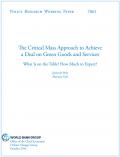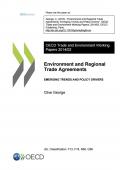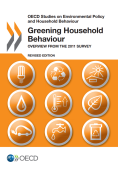
At the Davos forum of January 2014, a group of 14 countries pledged to launch negotiations on liberalizing trade in "green goods" (also known as "environmental" goods), focusing on the elimination of tariffs for an Asia-Pacific Economic Cooperation list of 54 products. The paper shows that the Davos group, with an average tariff of 1.8 percent, has little to offer as countries have avoided submitting products with tariff peaks for tariff reductions. Even if the list were extended to the 411 products on the World Trade Organization list, taking into account tariff dispersion, the tariff structure on environmental goods would be equivalent to a uniform tariff of 3.4 percent, about half the uniform tariff-equivalent for non-environmental goods. Enlarging the number of participants to low-income countries might be possible as, on average, their imports would not increase by more than 8 percent. However, because of the strong complementarities between trade in environmental goods and trade in environmental services, these should also be brought to the negotiation table, although difficulties in reaching agreement on their scope are likely to be great.
Japan, South Korea, and Taiwan are deficient of domestic fossil energy sources and depend significantly on imported fuels. Since the oil shock in the 1970s, all three countries have promoted renewable energy as an alternative energy source to improve energy security. Currently, renewable energy is being promoted to build low-carbon economies. This study reviews the development of renewable energy policies and roadmaps. It also examines and compares strengths, weaknesses, opportunities, and threats (SWOT) of these countries in the context of advancing renewable energy policies and technologies and expanding domestic renewable energy installations, as well as strategically positioning themselves in the international renewable energy market as exporters of clean energy technologies. Through the SWOT analysis, this paper identifies a capacity for additional renewable energy deployment in these countries and highlights the necessity of increased cooperation between the three countries to strengthen their domestic and regional renewable energy sectors and compete in the global renewable energy market in the post-Fukushima era.
This guideline provides practical tools for city planners and decision makers to reform urban planning and infrastructure design according to the principles of eco-efficiency and social inclusiveness. It includes case studies from the Republic of Korea, the Philippines, Japan and Sri Lanka.

This report examines trends in the use of environmental provisions in Regional Trade Agreements and identifies factors which may explain the presence or absence of these provisions. The report builds on work of the OECD Joint Working Party on Trade and Environment (JWPTE) and includes results of an informal survey of delegates.
Analysis of the environmental provisions in RTAs reveals an encouraging upward trend. While basic provisions remain the most common types found in RTAs, the incidence of more substantive provisions has increased significantly in recent years. Among these, environmental co-operation has been the most common type.
Several factors may have contributed to this evolution. These include countries extending their political mandates for RTAs, for example to include provisions for compliance with multilateral environmental agreements (MEAs), as well as a general accumulation of experience with the use of environmental provisions.
The report includes case studies from Australia, Canada, Chile, the European Union, Japan, New Zealand, United States and Switzerland.

Developing growth strategies that promote greener lifestyles requires a good understanding of what factors affect people’s behaviour towards the environment. Recent OECD work based on periodic surveys of more than 10, 000 households across a number of countries and areas represents a breakthrough by providing a common framework to collect unique empirical evidence for better policy design.
This publication presents responses from the most recent round of the OECD survey implemented in 2011 in 5 areas (energy, food, transport, waste and water) and 11 countries: Australia, Canada, Chile, France, Israel, Japan, Korea, the Netherlands, Spain, Sweden and Switzerland.
Analysis comparing the data across countries, policy conditions and households’ characteristics reveals which measures most effectively change behaviour. Each round of the survey also allows to track changes over time and to explore new emerging issues.
